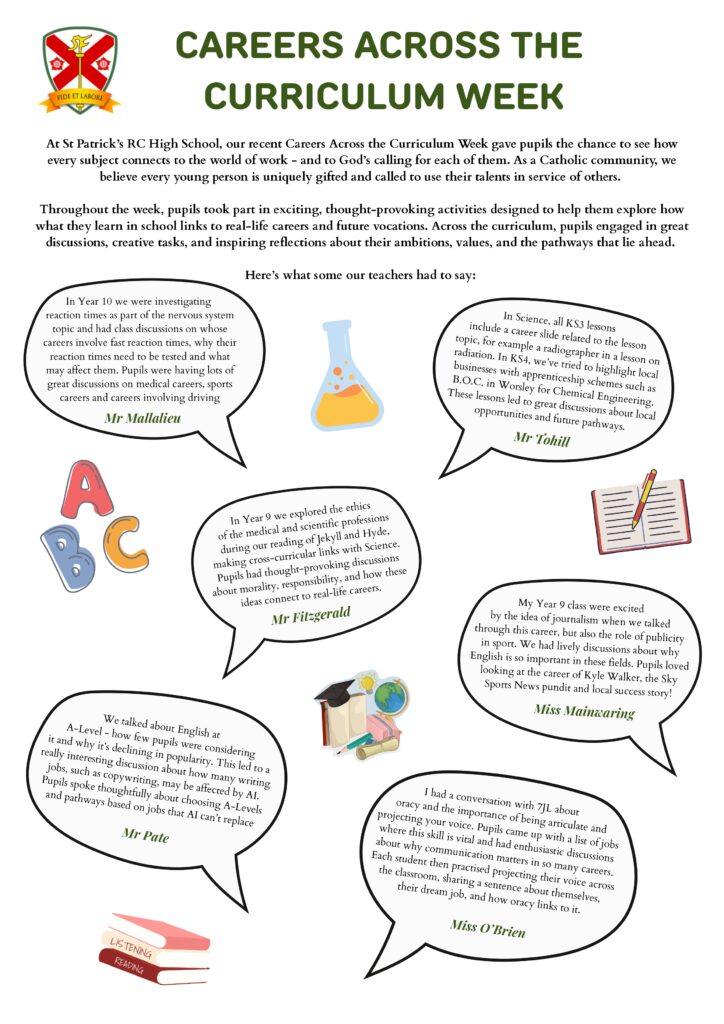Careers Leaders in School
If you need to speak to any members of staff in relation to careers or post-16 provision, please contact Miss H Mainwaring on mainwaring.h@stpatricksrchigh.co.uk(opens in new tab) or 0161 921 2301. Alternatively, please contact our school based careers advisor as below.
School Based Careers Advisor
Our Careers Advisor, Hannah Fox visits school each week. Hannah meets with every student in Year 10 and Year 11 to ensure they are given individualised advice and guidance on their proposed courses and routes post 16. Accordingly, each and every pupil receives an individual action plan. If you would like to speak to Hannah or arrange a careers meeting, please see her in her office when she is in school. Alternatively, speak to your form tutor or Miss Mainwaring.
Careers Resources
Throughout your time here, you will be provided with a wealth of information in order to make an informed decision about your future. You will also receive advice, guidance and development on ‘real world’ skills which you will need to navigate yourself through the next steps, once you leave St. Patrick’s. The following website provides you with some excellent information on: careers education, advice and guidance, emotional health, apprenticeships/training and employability skills: https://www.salford.gov.uk/14to16(opens in new tab)
Post-16 Pathways
After your GCSE examinations there are many different avenues to take and these are all dependent on your aspirations, the grades you get in your exams and what type of learning you want to receive once you leave school. Although there are more and more avenues available each year, below are the three main routes which pupils tend to take:
A-Levels
A Levels are Level 3 qualifications that you can choose to take after your GCSEs. You can take A Levels in schools, sixth form centres or at a Further Education College. They are very well regarded by universities and employers. A Levels will give you a chance to find out about your GCSE subjects in greater depth or you can choose to study one of the subjects that many schools and colleges only offer at A Level such as Law, Economics or Psychology.
They are good preparation if you are thinking of going onto higher education or if you are not sure of your career plans as they can keep your options open.
Most sixth forms and colleges will be looking for grades 4-9 in your GCSEs. A full A Level qualification is achieved after 2 years of study. How many you take depends on how well you have done in your GCSEs and what the sixth form or college suggests would be best for you.
Vocational Qualifications
Many schools offer a range of vocational courses like BTECs and OCR Cambridge qualifications and many more are available in colleges. By applying learning to real-life situations, these qualifications offer a more practical approach than more traditional A-Level academic courses.
Vocational subjects – these are related to a broad employment area such as business, engineering, IT, health and social care. Previously called BTECs and OCR Cambridge Nationals, if they are at Level 3 these are now called Applied Vocational Qualifications. These courses are offered in schools and colleges.
Vocational courses – these courses lead to specific jobs such as hairdressing, accounting, professional cookery or plumbing. These courses are called Tech Levels (if they are at Level 3) and are offered mostly at colleges.
Applied General Qualifications and Tech Levels are the same level qualifications as A-Levels – they are all Level 3 and are considered as entry requirements to many higher education courses or to employment. Choosing a vocational qualification can be a good option if you have a job sector in mind for the future or if you would like to gain employability skills linked to a particular type of work.
Apprenticeships
An apprenticeship is a great way to learn on the job, building up knowledge and skills, gaining qualifications and earning money at the same time. You will spend most of your time in the workplace gaining job-specific skills, but you will also be supported by a specialist learning provider to build up your knowledge and qualifications.
There are no set entry requirements as this depends on the apprenticeship, however, apprenticeships have grown very popular in previous years and there is a lot of competition, so good qualifications are important, as well as being motivated and committed.
Apprenticeship training can take between one and four years to complete and the length of your apprenticeship will depend on its level, the industry you’re training in and the skills you already have. It is important to note that there are different levels of apprenticeship and higher level apprenticeships will require higher grades and/or experience.
Open Days
We advise that students visit as many open days as possible, to get a real feel for the colleges or providers that they are interested in and ask relevant questions about the courses, whether these be face to face open days or those which happen virtually.
Careers Across the Curriculum Week
At St Patrick’s RC High School, our recent Careers Across the Curriculum Week gave pupils the chance to see how every subject connects to the world of work — and to God’s calling for each of them.
As a Catholic community, we believe every young person is uniquely gifted and called to use their talents in service of others. Throughout the week, pupils took part in exciting, thought-provoking activities designed to help them explore how what they learn in school links to real-life careers and future vocations. Across the curriculum, pupils engaged in great discussions, creative tasks, and inspiring reflections about their ambitions, values, and the pathways that lie ahead.
Here’s what some our teachers had to say:


